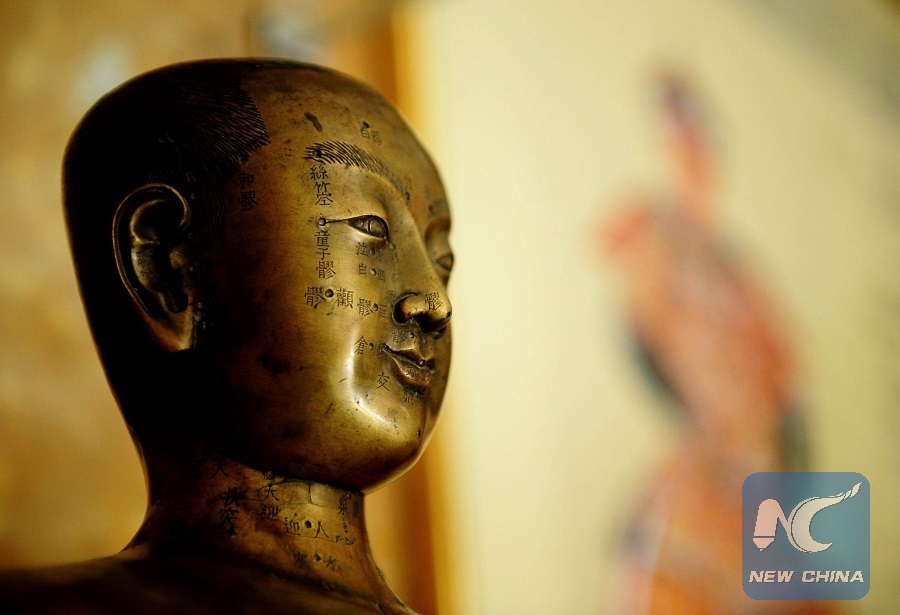
File photo taken on March 10, 2008 shows details of an ancient bronze figure which was used for acupuncture teaching and research, collected by China's Tongrentang, a pharmaceutical giant with a history of more than 300 years, in Beijing, capital of China. Chinese President Xi Jinping presented a bronze acupuncture statue on Jan. 18, 2017 to the World Health Organization (WHO) in Geneva, Switzerland, which shows acupuncture points on the human body.(Xinhua/Wang Jianwei)
GENEVA, Jan. 25 (Xinhua) -- From exporting low-cost and effective vaccines and deploying medical teams against major outbreaks to promoting health cooperation under the Belt and Road Initiative, China has been increasingly involved in global health affairs, benefiting the world with its enhanced medical capacities and expertise.
Seth Berkley, CEO of the Global Alliance for Vaccines and Immunization (GAVI), told Xinhua in a recent interview that Chinese vaccines are "significantly cheaper" than those made by many other countries.
GAVI-procured Chinese-made Japanese encephalitis (JE) vaccines are up to 95 percent less expensive than those produced in the West.
Transmitted by mosquitoes, JE represents the leading cause of viral encephalitis in Asia and the Western Pacific.
With an average price of 42 U.S. cents per dose, the live attenuated vaccine made by the Chengdu Institute of Biological Products, is providing life-saving protection to millions of children in low-income countries, including Laos, Nepal and Cambodia, under GAVI's program, according to Berkley.
Some 27.7 million doses of Chinese-manufactured JE vaccines have been committed by GAVI. In light of this, Berkley hailed the fact that China has moved on from being a GAVI recipient to being a key supplier and donor of vaccines.
Chinese JE vaccines became available on the global market after the World Health Organization (WHO) endorsed China's vaccine regulatory body in 2011. JE vaccines subsequently became the first prequalified Chinese vaccine to ever be licensed for use on children in 2013.
"We are seeing huge potential for China to supply the global public vaccine market via WHO prequalification, including for emergency outbreaks such as yellow fever and Ebola," WHO Director-General Margaret Chan told Xinhua prior to Chinese President Xi Jinping's visit to Switzerland earlier this month.
During the unprecedented Ebola outbreaks which paralyzed West Africa, China sent over 1,200 medical workers to affected regions. Chinese medical experts trained more than 13,000 local medical workers to treat Ebola patients in nine countries in Africa.
"China was the first international donor to provide hands-on clinical support, working in dangerous conditions and returning with no infections," noted Chan. "China exercised strong global leadership in response to the Ebola virus disease outbreak in West Africa."
China and the WHO signed a memorandum of understanding pledging to step up health cooperation under the framework of the Belt and Road initiative last week.
Analysts said that the initiative will not only strengthen health cooperation between countries when it comes to fighting pandemics and building healthy populations, it will also offer numerous opportunities for the health industry.
"The greater connectivity offered by the initiative, its focus on joining together in consultation, sharing, and building ... will help create the right conditions to foster much better readiness for us to act against pandemic threats," Andrew Witt, CEO of GlaxoSmithKline (GSK), told Xinhua on the sidelines of the Davos forum.
The head of the international pharmaceutical giant believed "there will be many opportunities for GSK and other multinationals to explore within this framework."

